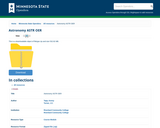
Full course with supplemental materials based upon the OpenStax Astronomy textbook.
- Subject:
- Astronomy
- Science
- Material Type:
- Full Course
- Provider:
- Minnesota State Opendora
- Author:
- JC Turner
- Kenny Tapp
- Date Added:
- 11/08/2019

Full course with supplemental materials based upon the OpenStax Astronomy textbook.
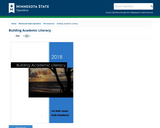
While many study skills, composition and reading skills texts separate these activities into discrete skills to be learned separately, this books recognizes that these skills are interconnected. A student who struggles with the reading will have a hard time writing about it or discussing it. A student who has inadequate strategies for listening to lectures will struggle to see the connections between the lecture and the reading. Therefore, this book moves away from the “skills and drills” texts that are so common in reading and writing textbooks. Instead, this book features process and provides opportunities for students (and instructors) to think about the best ways to approach academic tasks. For example, a “skills and drills” oriented book might teach students how to take Cornell Notes and use graphic organizers, but it does not provide any information for students that would allow them to decide when it would be best to choose one note taking method over the other. This book’s main focus is helping students develop that sort of judgement.
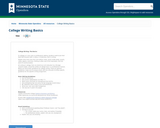
This is a resource to give to students about expectations for college writing, including links and resources for writing papers, emails, and more in an academic and professional manner.
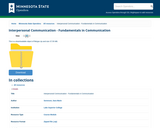
This is a D2L Brightspace module covering the foundations of communication . This is used as an introduction to an interpersonal communications course.
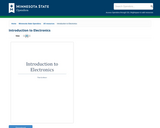
The advent of electronics has had a profound impact on our lives and impacted nearly every product that we use either directly or indirectly. Without electronics, present day computers, cell phones, stereos, televisions, and the internet would not be possible. And of course, without computers and modern communications tools, society could not have made the huge strides in fields such as medicine, aerospace technologies, meteorology, transportation, agriculture, education, and many others. It is for these reasons that the invention of the transistor is considered as one of the most important technological advancements in history.
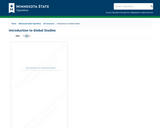
This textbook introduces students to the basic concepts, trends, perspectives and interconnections of global society. Through readings, discussions, videos, webcasts and other activities, students examine the interdependence of people around the world and global issues that affect these relationships. It will provide an overview of the history and theoretical approaches that have created a global society through topics such as global politics, human rights, the natural environment, population, disease, gender, information technology, war and peace. This is a required course for the Global Studies Emphasis.
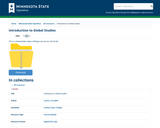
This course introduces students to the basic concepts, trends, perspectives and interconnections of global society. Through readings, discussions, videos, webcasts and other activities, students examine the interdependence of people around the world and global issues that affect these relationships. It will provide an overview of the history and theoretical approaches that have created a global society through topics such as global politics, human rights, the natural environment, population, disease, gender, information technology, war and peace. This is a required course for the Global Studies Emphasis.
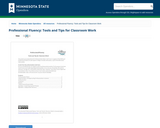
This document was prepared by the Professionalism Rubric Task Force in support of the 2016-2020 Master Academic Planning Goal #2: Professional Fluency at Lake Superior College in Duluth, Minnesota. It contains a rubric on professionalism, teaching strategies for the four aspects of professionalism on which the rubric is focused (Written and Oral Communication, Timeliness, Respect, and Taking Personal Responsibility), and appendices.
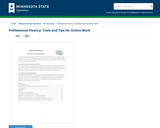
This document is an adaptation for online coursework of an original document prepared by the Professionalism Rubric Task Force in support of the 2016-2020 Master Academic Planning Goal #2: Professional Fluency at Lake Superior College in Duluth, Minnesota. It contains a rubric on professionalism, teaching strategies for the four aspects of professionalism on which the rubric is focused (Written and Oral Communication, Timeliness, Respect, and Taking Personal Responsibility), and appendices.
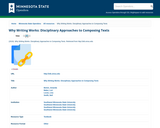
Why Writing Works: Disciplinary Approaches to Composing Texts is an open-access, online textbook resource for college writing. It is written for an audience of second-year college students with a focus on writing in the disciplines.
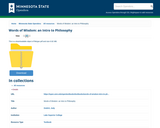
Words of Wisdom can come from anyone. In this text we discuss topics ranging from "Are Humans good by nature?" to "Is there a God?" to "Do I have the right to my own opinion?" Philosophy is the study of wisdom, and can emerge in our conversations in social media, in school, around the family dinner table, and even in the car. The text uses materials that are 2,500 years old, and materials that were in the news this year. Wise people come in all shapes and types, and from every culture on earth. We have poetry and folktales, sacred writings and letters. Dialogues and interviews, news columns, Ted Talks, You Tube recordings and even comedy are all a part of the content in this text.You will be most successful reading this on line.
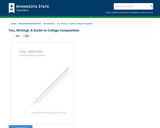
This text is meant to be used in any first year College Composition class or as a general guide to college writing. The book focuses on writing as a process, not a product. The goal is to help students discover their own writing process, trying out different methods and strategies to find what works best for them.